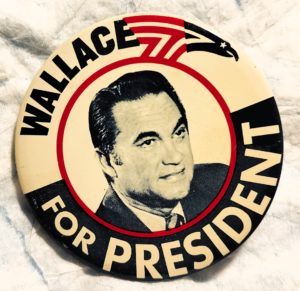By Paul Rozycki
Unhappy with the Republican and Democratic candidates for president this year? You have many third party options, but making those choices could have consequences you don’t like.
Third parties have never elected a president of the United States. We’ve had Democrats, Republicans, Whigs, and Federalists as presidents, but we’ve never elected a Libertarian, Socialist, Green Party, Prohibitionist, or Communist party member to the White House.
But that doesn’t mean that third parties haven’t played a major role in who gets elected and what policies they pursue, whether by pulling votes away from major party candidates or raising legislative concerns for specific voting blocs.
And this year, because the rematch between President Joe Biden and former President Donald Trump is so close — and because many voters are disenchanted with both major parties — it’s quite possible that a third party, and particularly the candidacy of Robert F. Kennedy Jr., could play a critical role
How third parties can decide who wins
While they have never won a presidential election, third parties have historically pulled enough votes from one of the major parties to give the other side a victory in some elections.
In 1912, former President Theodore Roosevelt ran on the Bull Moose Party. He lost, but he drew votes from Republican President Howard Taft and thereby the Democratic candidate, Woodrow Wilson, was elected.
In 1968 George Wallace’s third party run signaled the shift of the “Solid South” from the Democratic Party and laid the groundwork for Richard Nixon’s victory and the Republican takeover of the south in the following years.

A button from George Wallace’s presidential campaign. (Photo by Paul Rozycki)
In 1992, Ross Perot may have drawn votes from Republican George H.W. Bush to give Democrat Bill Clinton the victory, and many feel that the Green Party shifted just enough votes from Democrat Al Gore to give Republican George W. Bush the presidency in 2000.
More recently, some suggest that Jill Stein and the Green Party pulled just enough votes away from Hillary Clinton in 2016 to give Trump the advantage in a few key states.
Through all of this history, and perhaps because of it, major parties have been known to encourage and support certain third parties in the hope they will steal votes from their opponents.
How third parties make policy
In addition to potentially affecting the outcome of an election, there are many examples of third parties defining issues for the major parties.
In the early 1900s, socialist parties advocated for workers unions and a system of social security, ideas later supported by Franklin Roosevelt in the 1930s.
The Wallace candidacy in 1968 was a reaction against the civil right movement of the 1960s. The Libertarian Party, founded in 1971, helped set the stage for Ronald Reagan’s conservative administration in the 1980s. Perot’s 1992 campaign championed reducing the deficit and balancing the budget. By the late 1990s, President Clinton did that.
So, while they rarely win seats, third parties often raise key issues for the two major parties.
The Robert F. Kennedy Jr. candidacy
Robert F. Kennedy Jr. has emerged as the most significant third party candidate in the 2024 race, with a recent CNN poll showing him at 18 percent in Michigan and various other polls showing him at 3% to 16% nationally.
The independent candidate has two things working for him.
First is his famous name. Some voters will hear the name Kennedy and assume he shares the views of his father — former attorney general, senator, and presidential candidate Robert F. Kennedy, who was assassinated in 1968 as he ran for president — or his uncle, President John F. Kennedy. The name alone will bring much attention and perhaps votes, even though nearly all of the Kennedy family has spoken out against his candidacy.
Second, with his selection of tech entrepreneur and philanthropist Nicole Shanahan as his vice presidential running mate, he will gain access to major campaign funds that few third parties typically have.
Robert F. Kennedy’s views
Kennedy’s views are an odd mix that could find support in both parties, making it hard to determine how he may affect the 2024 election.
Kennedy is perhaps best known as an “anti-vax” conspiracy advocate who feels that vaccinations of many kinds should be avoided. He has said that “no vaccine is safe and effective” and that they can cause autism, in spite of scientific evidence to the contrary. He has also authored a number of books attacking those who promoted vaccinations during the COVID-19 pandemic, and those conspiracy theories and his calls to “drain the swamp” often find support within the Republican MAGA Trump camp.
On the other hand, Kennedy has also spoken out on a number of environmental issues, won awards for his environmental activism, and is co-founder of the Waterkeeper Alliance, a network of environmental organizations fighting for clean water. Those views and his campaign against “corporate takeover” might find him support among some liberal Democrats.

(Image source: Robert F. Kennedy Jr. 2024 campaign website)
Yet, most of the backing for Kennedy seems to be coming from the Trump side of the aisle, at present, in the hope he will take votes away from Biden. Much of his funding is from groups that have supported Trump, and some of Kennedy’s recent comments suggest that he is running an anti-Biden campaign. In a CNN interview he called President Biden “a much worse threat to democracy” than Trump.
(Trump himself recently tweeted that Kennedy was a “much better” option for Democrats than President Joe Biden, but at the same time he called Kennedy “the most radical left candidate in the race.”)
Though Democrats seem more concerned than Republicans about Kennedy’s candidacy, it remains uncertain which party he might hurt most, as a few polls show increasing support for Kennedy among anti-Trump Republicans.
Also, as an independent candidate, Kennedy needs to get on the ballot of each of the 50 states ahead of the November election, and that can prove to be a challenge as all state laws and deadlines differ.
Presently, his campaign claims that he has met the requirements to be on the ballots of Utah, Idaho, Hawaii, Nebraska, Nevada and North Carolina. In Michigan, Kennedy will appear on the November ballot as the nominee of the Natural Law Party.
If he manages to get on all or most state ballots, he will certainly be a major factor in the 2024 election. However, those who vote for him may end up helping their adversaries: if Kennedy draws more Democratic voters, it will give Trump a boost, and if Republicans turn to him, it will aid the Biden campaign.
The other parties
While Kennedy is getting the most attention currently, he’s hardly the only third party candidate.
It’s likely that we’ll see candidates for the Libertarian, Green, and Prohibition parties; there are at least four socialist parties running for president this year; and political activist and social critic Cornel West is running in a number of states under several party labels.

Presidential candidate “Vermin Supreme” in January 2016. (Photo by Marc Nozell, accessed via Wikimedia Commons)
Significantly, there will be third party candidates in all seven of the swing-states that could determine the outcome of the Electoral College. In those states, even a few percentage points could make the difference.
But beyond the parties that are organized enough to get on state ballots, there are hundreds of others running write-in campaigns.
While most will never get on the ballot, some are serious, such as the Communist or Socialist parties; some are focused on a single issue, such as the Prohibition Party or the Legal Marijuana Now Party; and some are simply comic relief, such as “Vermin Supreme,” a performance artist who has run in every presidential election since 1992. (He campaigns with a rubber boot on his head, warns of a “zombie apocalypse” and promises “a pony for everyone.”)
So, there you have it. You have lots of other choices beyond the Democrats and Republicans in this year’s presidential election. But be careful, your third party vote might elect the candidate you disagree with most.
Or, you might get zombies and a pony.


You must be logged in to post a comment.